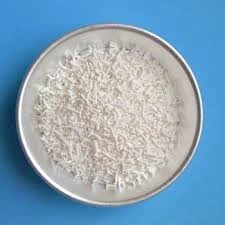
Exploring the Role of Emulsifier 481 in Enhancing Bread Quality and Texture
The Role of Emulsifier 481 in Bread Production
Emulsifiers play a crucial role in the baking industry, particularly in the production of bread. One such emulsifier, known as E481 or sodium stearoyl lactylate, has gained popularity due to its functional properties that enhance bread quality. This article explores the significance of E481, its benefits, and its application in bread-making.
The Role of Emulsifier 481 in Bread Production
One of the significant advantages of using E481 in bread making is its ability to retain moisture. By enhancing water binding in the dough, E481 helps to keep the bread fresh for longer periods. This moisture retention not only improves the sensory attributes of bread, making it softer and more palatable, but it also extends the shelf life, which is a crucial factor for commercial bakers looking to minimize waste and maximize profitability.
emulsifier 481 in bread

Additionally, emulsifier E481 contributes to the bread's volume and crumb structure. It aids in the gas retention during fermentation and baking, allowing for a well-risen loaf. The improved gas retention translates to a lighter texture, which is often sought after by consumers. Furthermore, the use of E481 can enhance the bread's slice quality, making it more appealing for various applications, from sandwiches to toast.
The incorporation of E481 is also beneficial from a nutritional standpoint. It can help reduce the amount of fat needed in formulations without compromising the quality of the bread. This reduction in fat not only meets consumer demands for healthier options but also aligns with industry trends focusing on reformulating products to be more health-conscious.
Despite its many advantages, the use of emulsifier E481 should be approached with care. Bakers must balance the quantity used to maintain optimal performance without overwhelming the product. Typically, the concentration of E481 in bread formulations is minimal, ensuring that it enhances the product without altering its essential characteristics.
In conclusion, emulsifier E481 is a valuable ingredient in bread production, with benefits that range from improved texture and shelf life to enhanced nutritional profiles. As the baking industry continues to evolve, the role of such emulsifiers will remain pivotal in meeting consumer expectations for quality and health consciousness in baked goods. Understanding and utilizing E481 effectively can lead to superior bread products that satisfy both bakers and consumers alike.
-
Pure Sodium Dichloroisocyanurate Dihydrate | Powerful DisinfectantNewsAug.29,2025
-
Industrial Chemicals: Quality & Purity for Every IndustryNewsAug.28,2025
-
Nitrile Rubber Honoring Strict Production StandardsNewsAug.22,2025
-
Aspartame Ingredients Honoring Food Safety ValuesNewsAug.22,2025
-
Fertilizer for Balanced Plant NutritionNewsAug.22,2025
-
Cyanide Gold Processing with High Purity AdditivesNewsAug.22,2025
-
Formic Acid in Textile Dyeing ApplicationsNewsAug.22,2025
Hebei Tenger Chemical Technology Co., Ltd. focuses on the chemical industry and is committed to the export service of chemical raw materials.
-

view more DiethanolisopropanolamineIn the ever-growing field of chemical solutions, diethanolisopropanolamine (DEIPA) stands out as a versatile and important compound. Due to its unique chemical structure and properties, DEIPA is of interest to various industries including construction, personal care, and agriculture. -

view more TriisopropanolamineTriisopropanolamine (TIPA) alkanol amine substance, is a kind of alcohol amine compound with amino and alcohol hydroxyl, and because of its molecules contains both amino and hydroxyl. -

view more Tetramethyl Thiuram DisulfideTetramethyl thiuram disulfide, also known as TMTD, is a white to light-yellow powder with a distinct sulfur-like odor. It is soluble in organic solvents such as benzene, acetone, and ethyl acetate, making it highly versatile for use in different formulations. TMTD is known for its excellent vulcanization acceleration properties, which makes it a key ingredient in the production of rubber products. Additionally, it acts as an effective fungicide and bactericide, making it valuable in agricultural applications. Its high purity and stability ensure consistent performance, making it a preferred choice for manufacturers across various industries.





